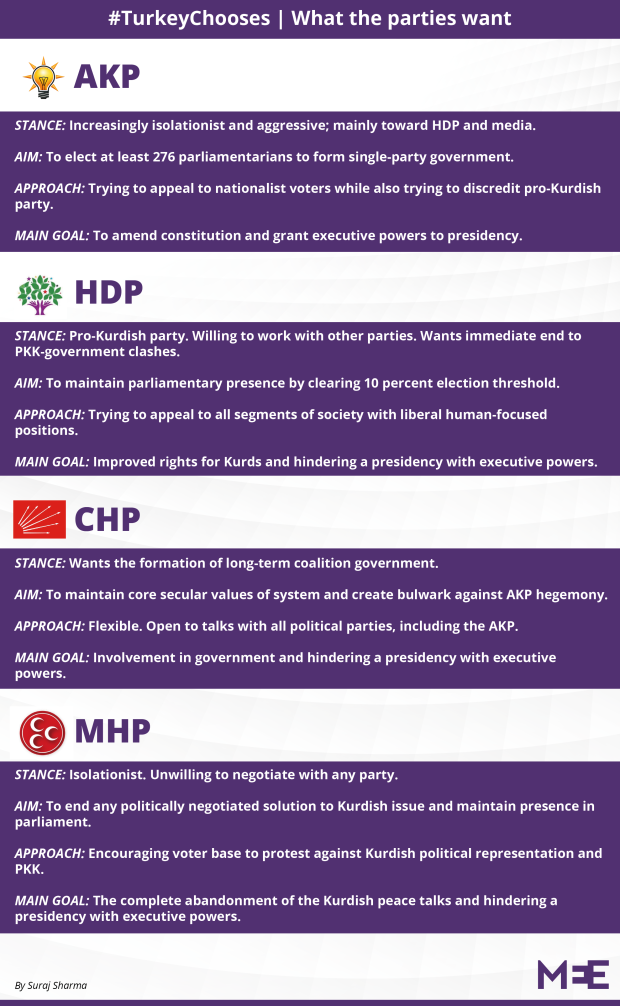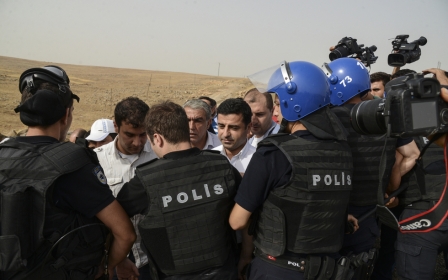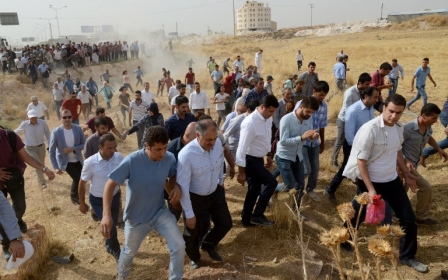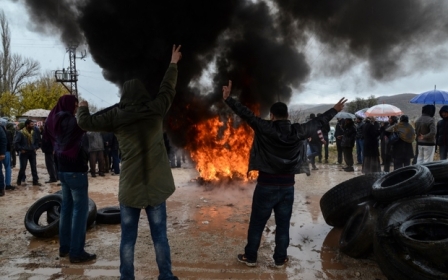ANALYSIS: Have political calculations in Turkey gone awry?
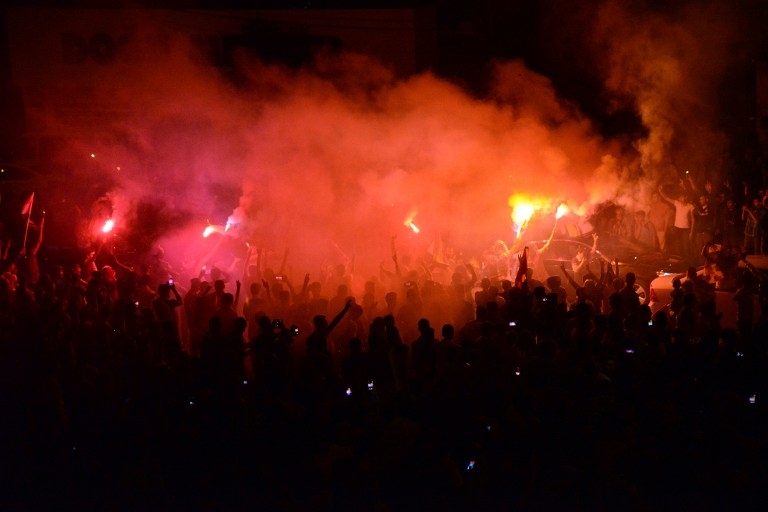
ISTANBUL, Turkey – The last few months have seen Turkey’s complicated political landscape unravel, with concerns growing that the major political players have miscalculated their positions and could send the country spiralling into uncertainty.
With the almost three-year-long ceasefire with the Kurdistan Workers’ Party (PKK) dead in the water, and tit-for-tat attacks happening almost daily, speculation is mounting that elections – scheduled for 1 November – will be postponed, or worse, things will unravel further and lead to an extended period of internal strife and violence.
The situation in the country's southeast is already dire with reports of states of emergencies, security zones and curfews imposed in many areas. Nationalist protests have broken out across the country and the main political camps appear to be worlds apart.
Idris Baluken, a parliamentarian from the Peoples’ Democratic Party (HDP) who represents Diyabakir, told Middle East Eye that he believes President Recep Tayyip Erdogan and his Justice and Development Party (AKP) are to blame for sparking instability in order to cling onto power.
“The AKP and Erdogan have opted for a climate of chaos and war simply so that it allows them to remain in power,” Baluken told MEE.
June elections left no single party with a clear majority, with subsequent coalition talks producing no result.
Baluken said he now fears that the AKP government’s decision to authorise large-scale army operations against the PKK could result in a situation even worse than those experienced in the country's southeastern regions during the 1990s when the military paid little heed to civilian casualties in pursuit of the PKK. The blockade of the town of Cizre - in which some 30 people are thought to have been killed since last week – is a prime example, he said, of events currently taking place.
“Even back then [in the 1990s] during the worst periods of martial law, the cutting off of an entire town for seven days and counting was unheard of,” Baluken said. “They are ransacking scores of villages now. This is a deliberate ploy to depopulate the area, and more than 80 civilians including children and women have been killed.”
The escalation began in July when a suicide bomber killed 32 pro-Kurdish activists in the border town of Suruc. The Kurds blamed the government for its alleged complicity – something which Ankara has flatly denied - and the PKK responded by killing two policemen. This prompted Ankara to launch attacks on the PKK in Iraq and Turkey. More than 100 Turkish soldiers have been killed since with the government saying it has killed hundreds of PKK fighters.
Muhsin Kizilkaya, an AKP lawmaker, told MEE that the accusations are a smear campaign.
“Of course it is saddening when news of so many deaths pours in,” he said. “We shouldn’t forget though that it is the duty of the government to restore and maintain public order. It is the PKK that started these clashes and is trying to disrupt public order.”
Nationalist rhetoric
The tensions have led to the growth of increasingly vitriolic nationalist rhetoric in Turkey.
The AKP has been targeting the HDP for months but the verbal attacks have become even harsher, with the AKP accusing the HDP of being subservient to the PKK and acting like it is its political wing.
Nationalist mobs have now begun attacking HDP offices as well as citizens on the basis of their ethnicity. Opposition newspapers have also been hit.
Critics say that the AKP has tried to endear itself to the nationalists, that government officials have turned a blind eye and that police and security forces have been slow to respond to these attacks.
The AKP’s Kizlkaya denies this, saying that Erdogan continues to command nationalist support and that such tactics run counter to the party’s core values.
“It was Erdogan during his time as prime minister who initiated the [Kurdish] peace process. But it wasn’t him who ended it,” he said. “The current situation is not election-related. His criticism is a response to those who have exploited the government’s goodwill in its quest for a peaceful resolution.”
“The government does not need to resort to violence to come to power. If such a thing was possible, then the PKK, which has been engaged in violence for more than 30 years, would be in power,” he added.
The sentiment is helping to rally AKP support amongst some voters. Cihan Sozeri, 18, a student and first-time voter, told MEE that he would vote for the AKP.
“Our country is surrounded by problems. Someone is always trying to damage our country. I am sure the state will take care of the issues,” he said.
Searching for relevance
For now, the leaders of the Nationalist Movement Party (MHP), have been the ones encouraging their supporters to protests - although they have not called for violent action directly.
Analysts believe that the MHP is using this as a tactic to stay relevant. In addition to investing most of its political capital on opposing a politically negotiated solution to the Kurdish issue and finding it particularly hard to stomach the official presence of the HDP in parliament, the MHP fears losing votes to the AKP.
The AKP sparked great alarm in MHP ranks last month when it lured away Tugrul Turkes, the son of the MHP’s founder, by offering him the position of deputy prime minister in the interim cabinet.
The Turkes name holds highly symbolic significance for nationalists and creating the grounds for his expulsion from the MHP is seen as bold victory for the AKP.
The HDP, which made history in June by passing the punishing 10 percent election threshold by relying on an inclusive, left-leaning progressive campaign, is bearing the brunt of attacks.
The AKP, which believes that the HDP’s success cost it a parliamentary majority for the first time since 2002, has adopted the tactic of a no-holds barred assault on the HDP. On the other end of the spectrum, the PKK is also believed to not being particularly enamoured by its electoral success fearing it could eventually undermine the PKK’s raison d’etre.
On the one hand the HDP is accused of not condemning the PKK’s actions rigorously enough, while on the other the PKK has rejected HDP that it stop hostilities.
The scope to find allies at this point seems limited. The opposition parties only seem to be united on one point – refusing any cooperation with the AKP unless Erdogan backs away from attempts to empower the presidency, something he seems loathe to do.
The deadlock has been mirrored by the electorate, with most polls indicating that Turkey will likely see another coalition government emerge from fresh elections.
Hamide Topoglu, 42, who works in the media entertainment sector, said that like many Turks she now feels disillusioned with the political process.
“It is always the same story. One step forward and multiple steps backward. No one is interested in peaceful coexistence and progress in this country. Believing anything else would just be wishful thinking,” she told MEE.
“I don’t think my vote will help change anything. I can only use it to punish the rulers who have brought this latest round of misery upon us.”
Kizilkaya of the AKP said he believes that coalition governments are not feasible in Turkey because political parties consider themselves to be enemies rather than rivals. However, if fresh elections yield similar results, there will be no choice but to try this approach.
“We can’t keep on having elections forever. If we are faced with a similar situation again then it will have to be a coalition government,” he said.
Fate of elections
Unless there is a drastic de-escalation in violence, however, it will be difficult to hold free and fair elections as scheduled.
“It will be impossible to hold any sort of elections if the situation remains the same,” said the HDP’s Baluken. “Forget election security, there is no life security in the southeast,”
Others are not as bleak. Kizilkaya described the situation as “saddening” but insists that, unlike its neighbours, Turkey has held elections under difficult circumstances, including in the 1990s.
Despite this, if the vote does not go ahead, or fails to help reach some kind of consensus, there are fears that tensions will spill over into street violence and possibly even ethnic strife similar to what is happening in Syria.
Turkey is certainly no stranger to such political limbo. Raging street battles rocked the country in the 1970s and culminated in a military coup in 1980, something that continues to serve as a stark reminder for many.
“Concerns are growing throughout society that we may be on the brink of civil war because of this unquenchable thirst of Erdogan and AKP to hang on to power,” said Baluken.
For now, the government has presented a tough line that peace talks are over. Whether this line will change due to political pragmatism as elections near remains to be seen but Baluken is pessimistic.
“The AKP and Erdogan have sabotaged the peace talks, left no chance of any coalition option, and dispatched their paid mobs to create ethnic strife on the streets. Holding on to power is the only thing that matters to them,” he said.
New MEE newsletter: Jerusalem Dispatch
Sign up to get the latest insights and analysis on Israel-Palestine, alongside Turkey Unpacked and other MEE newsletters
Middle East Eye delivers independent and unrivalled coverage and analysis of the Middle East, North Africa and beyond. To learn more about republishing this content and the associated fees, please fill out this form. More about MEE can be found here.


